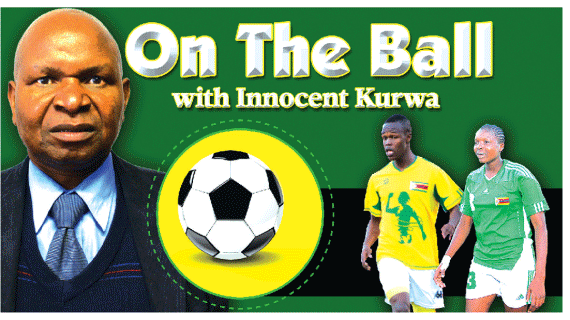
AT VIRTUALLY all workplaces in this country and the world over there is something called performance measurement which, according to human resource management specialists, basically implies keeping an eye on the performance of people in an organisation.
– Innocent Kurwa
Monitoring is linked to a – reward system.
The measurement of performance comes to mind now that we have a new ministry in charge of sport in the country.
Of course the portfolio also includes Arts and Culture, but my greater interest is on sport.
Would it not be very good and novel if minister Andrew Langa and his team agreed on some performance monitoring and measurement, no matter how crude and minimal, as a way of checking their service delivery?
Sport is something that cuts across political lines and most people that follow sport seriously forget their political alignments when it comes to discussions on sport matters.
In other words, it should be very easy for Zimbabweans, regardless of their political persuasion to sit down and agree on specifications of performance measurement for the new Sport ministry.
- Chamisa under fire over US$120K donation
- Mavhunga puts DeMbare into Chibuku quarterfinals
- Pension funds bet on Cabora Bassa oilfields
- Councils defy govt fire tender directive
Keep Reading
This suggestion is not that new and not something that Langa is not unaware of — except that he is probably more used to an overall assessment of the government as a whole rather than a specific ministry.
We have all heard of assessments in the media along the lines of 100 days into the life of a government or a particular leader.
The proposal is that Langa charts a new course of public accountability by accepting to be subjected to a performance appraisal of some sort.
Sport journalists and administrators could constitute a panel and sit down with Langa and his team to formulate the scorecard that would be used to assess the ministry.
The ministry would be assessed with Langa being its representative, something along the lines of him being the public officer of an organisation.
Of course, Langa, or any other politician for that matter, might fear that agreeing to such performance measurement might play havoc with his political popularity, especially if he continually “failed” the assessment.
The assessments can be conducted on a quarterly basis or even half-yearly.
The scorecard can be drawn up at an all-stakeholders meeting that brings together sports administrators and the ministry’s top officials.
Once the scorecard is agreed on, journalists would be neutral assessors periodically judging the performance of the ministry against set targets, clearly stated on the scorecard and in arriving at the targets the usual SMART concept could be administered — targets must be specific (add simple), measurable, attainable, relevant (add realistic) and time-bound.
There is a lot that the new ministry can do that is very specific and simple, measurable, attainable and relevant to the country. Of course, the time can be stretched to even a year for each target with evaluations made quarterly.
– Congratulations to Shabanie Mine FC for landing the BancABC Sup8r crown at the weekend and with it a cool $120 000 cash in prize money. A lot has been said about Shabanie Mine’s victory over FC Platinum in a final that stretched all the way to a penalty shoot-out with the victors edging their Midlands neighbours 5-3, but two issues stand out.
In his remarks after the victory, Shabanie coach Luke Masomere was emphatic that the victory was for the fans that stood by him during his Asiagate problems and the fans who travelled all over the country following and supporting their team.
Well done Masomere! Fans are the unsung heroes of all football clubs, but they are usually, almost always, forgotten when all praise is heaped on club executives and management as well as players.
Not a single second is spared for fans who use their hard-earned money to travel, risking life and limb, in support of their clubs and its players.
It is fantastic when people like Masomere are thoughtful enough to remember fans while basking in the limelight of capturing a trophy — many of us easily forget such heroes.
With the fans in mind, it is therefore understandable when supporters get emotionally hurt when their teams lose matches.
They will simply be counting the opportunity cost of the choice to spend their money on their team and, given how hard it is to get the US dollar today, it pains them when they are not rewarded for this choice. The only reward is to be given a win!
Of course this is not to suggest that fans, in their disappointment, should take matters into their own hands and be riotous or rowdy.
They should simply find more civil ways of expressing their unhappiness, for example by attending club general meetings and making their feelings clearly known at such meetings, or, in the extreme case, boycotting matches.
In the run-up to the BancABC Sup8r Cup final, reports were that Shabanie Mine FC players on Friday threatened to walk out as they sought to force the executive to commit itself to a 50-50 share of the $120 000 cash prize.
Reports now suggest the players got their way and are now waiting with bated breath for their share of the prize money. Good for the Shabanie players, but as they were driving this bargain, did they think of the future financing of the club?
Very often a few individuals in the club management sacrifice a lot of their personal finances to keep a club going and hardly a thought is spared for these when there are winnings to be shared.
This is not to suggest that players must not be rewarded for their efforts, but simply to argue that there are people behind the scenes who sacrifice a lot to keep a club afloat and that these individuals are also unsung heroes who should be remembered in times of triumph.










